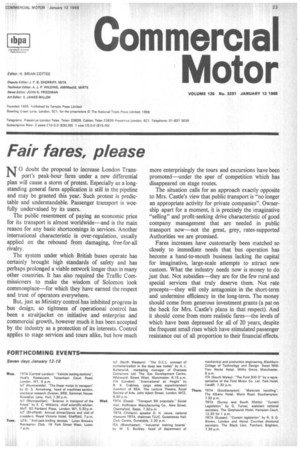Fair fares, please
Page 25

If you've noticed an error in this article please click here to report it so we can fix it.
N0 doubt the proposal to increase London Transport's peak-hour fares under a new differential plan will cause a storm of protest. Especially as alongstanding general fares application is still in the pipeline and may be granted this year. Such protest is predictable and understandable. Passenger transport is woefully undervalued by its users.
The public resentment of paying an economic price for its transport is almost worldwide—and is the main reason for any basic shortcomings in services. Another international characteristic is over-regulation, usually applied on the rebound from damaging, free-for-all rivalry.
The system under which British buses operate has certainly brought high standards of safety and has perhaps prolonged a viable network longer than in many other countries. It has also required the Traffic Commissioners to make the wisdom of Solomon look commonplace—for which they have earned the respect and trust of operators everywhere.
But, just as Ministry control has inhibited progress in bus design, so tightness of operational control has been a straitjacket on initiative and enterprise and commercial growth, however much it has been accepted by the industry as a protection of its interests. Control applies to stage services and tours alike, but how much more enterprisingly the tours and excursions have been promoted—under the spur of competition which has disappeared on stage routes.
The situation calls for an approach exactly opposite to Mrs. Castle's view that public transport is "no longer an appropriate activity for private companies". Ownership apart for a moment, it is precisely the imaginative "selling" and profit-seeking drive characteristic of good company management that are needed in public transport now—not the great, grey, rates-supported Authorities we are promised.
Fares increases have customarily been matched so closely to immediate needs that bus operation has become a hand-to-mouth business lacking the capital for imaginative, large-scale attempts to attract new custom. What the industry needs now is money to do just that. Not subsidies—they are for the few rural and special services that truly deserve them. Not rate precepts—they will only antagonize in the short-term and undermine efficiency in the long-term. The money should come from generous investment grants (a pat on the back for Mrs. Castle's plans in that respect). And it should come from more realistic fares—the levels of which have been depressed for all of 20 years, despite the frequent small rises which have stimulated passenger resistance out of all proportion to their financial effects.
















































































































